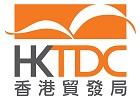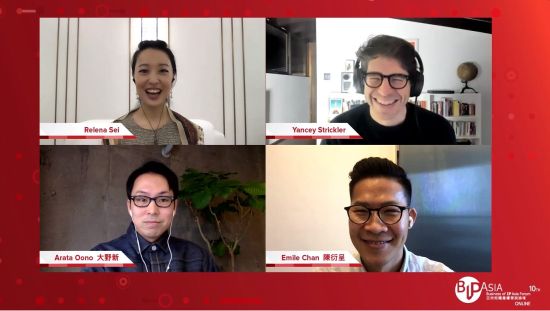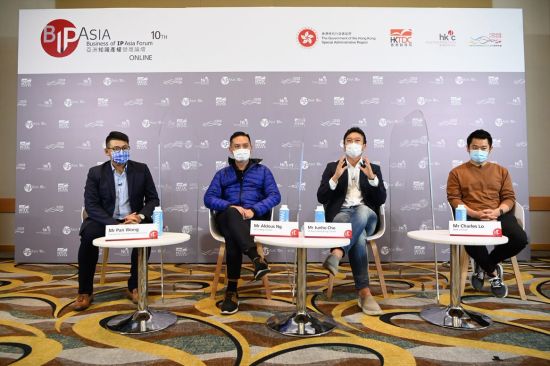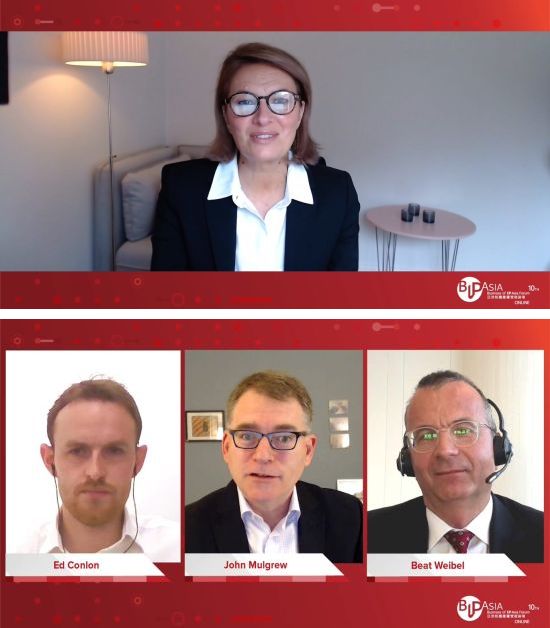Business of IP Asia Forum closes
- Written by ACN Newswire - Press Releases

|
|
| In the keynote session at the Business of IP Asia Forum, Yancey Strickler, Co-founder and former CEO of Kickstarter (top right), shared his experience in creating Kickstarter, a global crowdfunding platform. Arata Oono, founder of Borderless (above left), and Emile Chen, CMO & Co-founder, Origami Group (above right) also shared their insights in the keynote session moderated by Relena Sei, CEO of Jumpstart Media Limited (top left). |
|
|
| Previous participants in IPHatch Hong Kong shared their experience and tips for start-ups joining the competition this year. They included (left to right from second left) Aldous Ng, Co-founder and CEO, CU Coding Limited; Junho Cho, Chief Technology Officer, EC Bento Hong Kong Limited; and Charles Lo, Founder & Director, MAE Limited. The session was moderated by Pan Wong, Board of Governors & Co-founder (GBA) Hong Kong Chapter, International IP Commercialization Council (left). |
|
|
| Sharing their thoughts on "Creating IP Value through Collaboration" in the plenary session of the first day were Christina Petersson, Chief Intellectual Property Officer of Ericsson (top); Beat Weibel, Chief IP Counsel and Group Senior Vice President of Siemens AG (above right); and John Mulgrew, Vice President, Deputy General Counsel and Chief Intellectual Property Officer of Lenovo (above centre). Also pictured (above left) is panel chair Ed Conlon, Managing Editor of Managing IP. |
BIP Asia Forum Online provided various interactive channels to connect speakers, panellists and audiences from different industries. Business leaders and IP experts gave valuable advice on expanding business networks, building opportunities and the significance of IP in the post-COVID-19 era. The forum offered an ideal platform for exchange of ideas and information, connecting entrepreneurs and adding value to their businesses during this challenging time.
'Dream of the Internet' helps entrepreneurs and start-ups share ideas
The keynote session at the online forum saw Yancy Strickler, Co-founder and former CEO of Kickstarter, sharing his experience of creating Kickstarter, the famous global crowdfunding platform, and his subsequent journey. The first successfully funded project on the platform was "drawing for dollars", with other projects including Peloton, Cards against Humanity, Oculus Rift, Allbirds and more, many of which have become well-known brands.
Mr Strickler believes Kickstarter is a platform where entrepreneurs and start-ups can share ideas they are passionate about, and where creative projects can be opened up to the public. He called Kickstarter "a funnel for ideas" and said it was important to build trust between creators and the audience using the platform. Today, Kickstarter has become a facilitator in creating billions of dollars of profits and hundreds of thousands of jobs, opening a door to the public and the things they care about. He concluded that Kickstarter is the "dream of the Internet" as it fulfils the idea of what the World Wide Web aims to be.
Mr Stickler also shared his "bento" theory with the audience, explaining that he makes a bento plan every Sunday. It acts as a weekly plan that reminds him of his goals and identifies what is important. There are four spaces in the bento: now me, future me, now us, future us. He said the bento plan can help us to be actively aware of what are we going to do and what issues we need to prioritise in life. He said we should make decisions that can fulfil all the spaces in the bento - a way of planning that can help people to achieve their goals and understand the real values in life.
Also sharing during this session was Arata Oono, founder of Borderless, who is working on products related to motorcycles such as the development of a smart helmet. He explained that he ran a campaign on Kickstarter and was able to reach his goal within one day. He said that the pre-campaign is as important as the real campaign because it can build awareness and develop a community around the products. Mr Oono said crowdfunding is not about fundraising but more about developing a marketing platform that can help companies to grow.
Emile Chen, CMO & Co-founder, Origami Group, said Kickstarter is a platform that can help to generate awareness, find people with the same values and elicit valuable feedback. He had worries about people copying Origami's idea but said there will always be risks involved with getting to market. He pointed out that if someone else is trying to do what you are doing, it proves you are working on something worthwhile. Mr Chen also mentioned that the protection of IPs should be approached like good hygiene - it is something that has to be done, and the best protection is always to act fast and think about what you need to do next. He suggested that new start-ups should plan for a longer campaign period on the crowdfunding platform as it takes time for people to digest ideas and build trust with the company.
Experts and winners share on merits of IPHatch Hong Kong
A number of renowned and highly experienced entrepreneurs shared their ideas regarding IP in this rapidly changing new era. Jari Vaario, Head of Asia Patent Transactions & External Alliances, Nokia, said the company is finding unique new possibilities and innovations. He believed that the open-innovation competition IPHatch, details of which were announced during the forum, could provide unique innovation opportunities for start-ups. Mr Vaario said that IP matters are becoming more important in the new era as having an IP can be a way for start-ups to win against their competitors. Mr Vaario suggested start-ups should look into IP carefully as it takes time and money to secure a patent.
Yoshinori Nakagawa, Chief Intellectual Property Specialist, Panasonic Corporation, said that since the 2000s, Panasonic has shifted its focus to creating technology that can contribute to its future business. He said he was hoping to find good partners to tackle problems together through IPHatch. He mentioned two important roles of IP. First, it allows technologies to be organised in the patent portfolio, which helps maintain and update the newest technology and allow companies to understand their value through IP. Second, it protects the business and its technology assets as the patent gives exclusive rights to use that particular technology. That's why it is important for start-ups to get an initial patent.
Tony Chen, Business Development Director, Hong Kong X-Tech Startup Platform, talked about the Hong Kong Special Administrative Region Government's policy and support schemes in relation to IP. He pointed out that IP and technologies are important for start-ups and that investors would look to back companies that had certain IP protections in place. He said that patents are important for start-ups in terms of attracting big customers and generating a good profit. He hopes that IP can become more accessible in the future, especially for start-ups.
Previous winners of IPHatch were on hand to share their insights. Aldous Ng, Co-founder and CEO, CU Coding Limited, said the company is working on network coding for the application of 5G technology in Hong Kong. He said that IPHatch is a good platform for start-ups to present their ideas and connect with more experienced partners, adding that persistence is important because innovation can be a lengthy process. Junho Cho, Chief Technology Officer, EC Bento Hong Kong Limited, developed intelligent vending machines with an aim to revolutionise the way hot food is delivered. He said that IP is important to his business as it helps to protect his innovations, while IPHatch allowed him to develop his networks. Charles Lo, Founder & Director, MAE Limited, developed an emotion tracking system that aims to improve customer service. He said there are two benefits of joining IPHatch, namely mentorship and media exposure. He explained that IP is a way for start-ups to gain creditability and make their company more attractive to investors.
Open innovation - creating new pathways for value creation
In the forum's plenary session, John Mulgrew, VP, Deputy General Counsel & Chief Intellectual Property Officer, Lenovo, talked about the "open innovation models' diagram", explaining that start-ups and other companies should absorb technology from the outside, listen to customer feedback and communicate more with suppliers. These interactions with external parties help to make better products and more effective marketing services. Mr Mulgrew introduced the concept of "inside-out innovation", which refers to creating something for a specific purpose, but which turns out to have broader application. He pointed out that there are various legal issues involved in collaborations such as access to IP, preserving differentiation and ownership. There are different kinds of collaboration too, including joint inventorship and overlapping development, while companies need to give serious consideration to the legal aspects.
Christina Petersson, Chief Intellectual Property Officer, Ericsson, said collaborations are helping to improve global standards, giving the example of Ericsson's collaboration with Chinese smart device manufacturer OPPO on 5G technologies. She said that innovative technology exchanges allow more parties to participate, while a licence helps to ensure there is no overlapping. She also shared on the interface between IP and competition law, explaining that more countries and regions now have competition laws in place, which helps to resolve arguments over competition and protect innovations and the creative industry. She said competition laws also encourage the smoother functioning of industry.
Beat Weibel, Chief IP Counsel and Group Senior Vice President, Siemens AG, said that as the world becomes more digital and interconnected, no company is in position to master all the technologies alone, and that success is all about collaboration and differentiation. He gave the example of Siemens' electronic motors, where all elements in the motors can communicate and interconnect. Mr Weinel said IP is essential, otherwise companies will lose their advantages and rights. IP rights define both the ownership and scope of intellectual achievement, and Mr Weibel said such rights are the only bridge to turn inventions into innovations. He concluded that there can be no success without collaboration.
Global Tech Summit - turning crisis into opportunity
Co-organised with Hong Kong Science and Technology Parks Corporation, the Global Tech Summit brought together technology leaders, scientists and researchers, including Professor Li Zexiang, Department of Electronic and Computer Engineering at the Hong Kong University of Science and Technology (HKUST). Prof Li, who is conducting research into robotics and automation, shared that building a company is very different from research because it also requires looking at customers' needs and doing marketing. He said that transferring good technology into products can take a long time - and it also requires time to educate customers.
Prof Li said there are many opportunities for innovation and technology under the pandemic due to changes in the way people live and work. New needs, problems and demands arise, creating opportunities for innovative services and products. He said the pandemic offers an important lesson - that the future will be uncertain and full of challenges. He observed that start-ups which survive the pandemic are usually calm, analysing the supply chain then forming a crisis plan. He advised incubators, accelerators and universities to hold more technology-related education and training programmes for new businesses, connecting them with the supply chain and preventing them from falling into business traps.
Prof Li said he is excited about the future prospects of technology because of rising demand in the consumer market. He suggested start-ups begin by looking into the needs of industry and customers and then work backwards. The key to success, he said, is to have a big idea and then balance the technology with design. He believes that technology companies are going to change our mode of living.
Exploring technological disruptions in healthcare amid the pandemic
The third and final session of the Global Tech Summit focused on recent technological developments in the healthcare industry. Alexander Ng, Vice President, Tencent Healthcare, talked about how Tencent is supporting the fight against COVID-19, explaining that the healthcare industry is very complicated as it involves many factors such as the needs of users, accurate information and trends in the pandemic. Tencent has put more resources into online consultations and online-to-offline connectivity through Weixin (WeChat). Online tools such as COVID-19 situation maps, trend analyses and a fever chatbot have also been developed, while existing tools were swiftly modified. Electronic health cards connect to COVID-19-related data to enable people to resume their daily activities, while electronic health insurance cards enable online healthcare transactions.
Other developments at Tencent include artificial intelligence (AI) solutions for physicians that can locate infected areas in the lungs through deep learning and also support the early triage of critically ill COVID-19 patients. The company now supports nearly 1.2 billion users and the company's COVID-19 update models have been used more than 12 billion times. Mr Ng said that Tencent aims to connect consumers to healthcare services in the future and is also developing a one-stop-shop health tool kit for Weixin users.
The forum is now available for viewing through video-on-demand on the BIP Asia Forum Online website.
Website- Business of IP Asia Forum: http://bipasiaforum.com/- Photo download: https://bit.ly/37H7ktj
About HKTDC
The Hong Kong Trade Development Council (HKTDC) is a statutory body established in 1966 to promote, assist and develop Hong Kong's trade. With 50 offices globally, including 13 in Mainland China, the HKTDC promotes Hong Kong as a two-way global investment and business hub. The HKTDC organises international exhibitions, conferences and business missions to create business opportunities for companies, particularly small and medium-sized enterprises (SMEs), in the mainland and international markets. The HKTDC also provides up-to-date market insights and product information via trade publications, research reports and digital news channels. For more information, please visit: www.hktdc.com/aboutus. Follow us on Twitter @hktdc and LinkedIn.
Contact:Clayton Lauw, Tel: +852 2584 4472, Email: clayton.y.lauw@hktdc.orgChristine Kam, Tel: +852 2584 4514, Email: christine.kam@hktdc.orgCathy Lee, Tel: +852 2584 4393, Email: cathy.wk.lee@hktdc.org
Copyright 2020 ACN Newswire. All rights reserved. www.acnnewswire.com
Authors: ACN Newswire - Press Releases
Read more //?#








